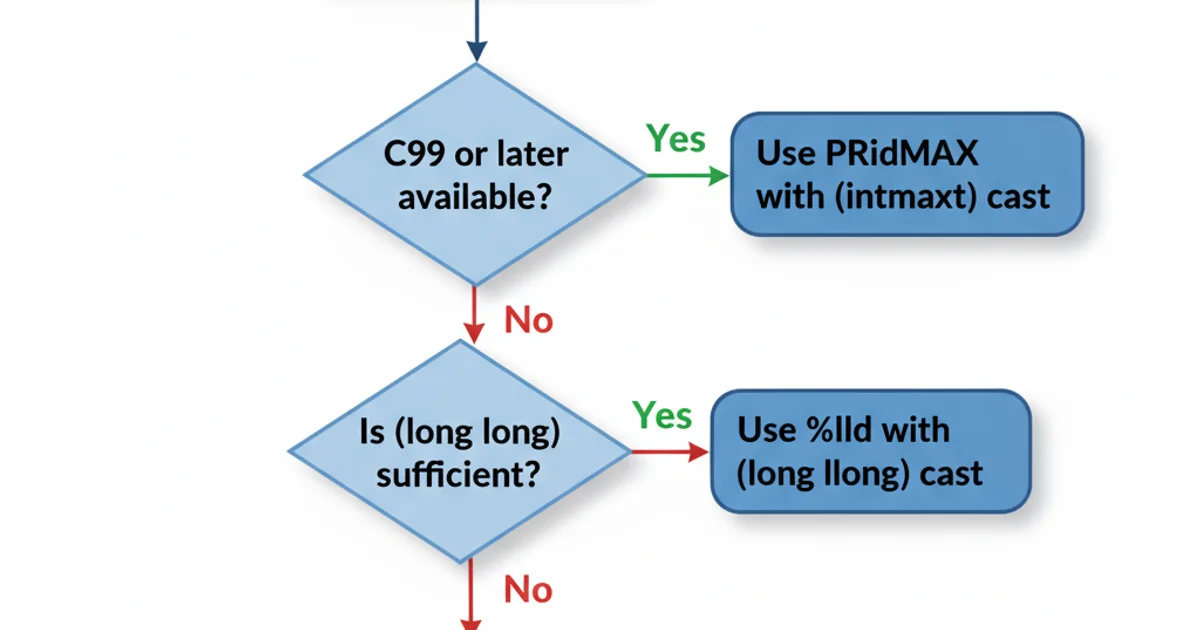What is the correct printf specifier for printing pid_t
Categories:
What is the Correct printf Specifier for pid_t?

Understand the challenges of printing pid_t values in C and learn the correct, portable methods using printf format specifiers.
When working with system programming in C, you often encounter the pid_t data type, which represents process IDs. While it seems straightforward to print these values using printf, the exact format specifier can be a source of confusion due to pid_t's varying underlying type across different systems. Using an incorrect specifier can lead to undefined behavior, including incorrect output or even crashes.
Understanding pid_t
pid_t is a signed integer type defined in <sys/types.h> (and often included by <unistd.h>). Its exact size and underlying type (e.g., int, long, short) are implementation-defined. This variability is precisely why a universal printf specifier isn't immediately obvious. The POSIX standard specifies that pid_t is a signed integer type capable of representing a process ID. It does not, however, mandate a specific size or underlying type.
printf format specifier for pid_t can lead to undefined behavior. This means your program might work on one system but fail or produce garbage output on another, making portability a significant concern.The Portable Solution: PRIdMAX and (long long) Cast
The most robust and portable way to print a pid_t is to cast it to a known-size integer type and then use the corresponding format specifier. The C99 standard introduced the <inttypes.h> header, which provides macros for fixed-width integer types and their printf format specifiers. Specifically, PRIdMAX is designed for printing intmax_t, which is the largest signed integer type available. Casting pid_t to (long long) and using %lld is also a widely accepted and portable approach, as long long is guaranteed to be at least 64 bits and can accommodate any pid_t value.
#include <stdio.h>
#include <unistd.h>
#include <sys/types.h>
#include <inttypes.h> // For PRIdMAX
int main() {
pid_t my_pid = getpid();
// Method 1: Using PRIdMAX (most robust C99+)
printf("My PID (PRIdMAX): %" PRIdMAX "\n", (intmax_t)my_pid);
// Method 2: Casting to long long (widely portable)
printf("My PID (long long): %lld\n", (long long)my_pid);
// Method 3: Casting to long (often works, but less guaranteed than long long)
printf("My PID (long): %ld\n", (long)my_pid);
return 0;
}

Decision Flow for pid_t printf Specifier
Why Not Just %d or %ld?
While pid_t is often an int or long on many systems, relying on %d or %ld directly is not strictly portable. If pid_t happens to be long on one system and you use %d, or int on another and you use %ld, you risk undefined behavior. The C standard does not guarantee that pid_t will always fit into an int or long without a cast, nor does it guarantee its exact size relative to these types. The explicit cast ensures that the value is promoted to a type for which the printf specifier is guaranteed to be correct.
<inttypes.h> when using PRIdMAX and similar macros. This ensures that the macros are correctly defined for your compiler and system.Practical Considerations and Best Practices
For most modern systems and compilers (C99 and later), using PRIdMAX with an (intmax_t) cast is the most technically correct and robust solution. If you are working with older compilers or environments where <inttypes.h> might be problematic, casting to (long long) and using %lld is an excellent alternative that offers very high portability. Avoid making assumptions about the underlying type of pid_t without explicit casts and standard-compliant format specifiers.